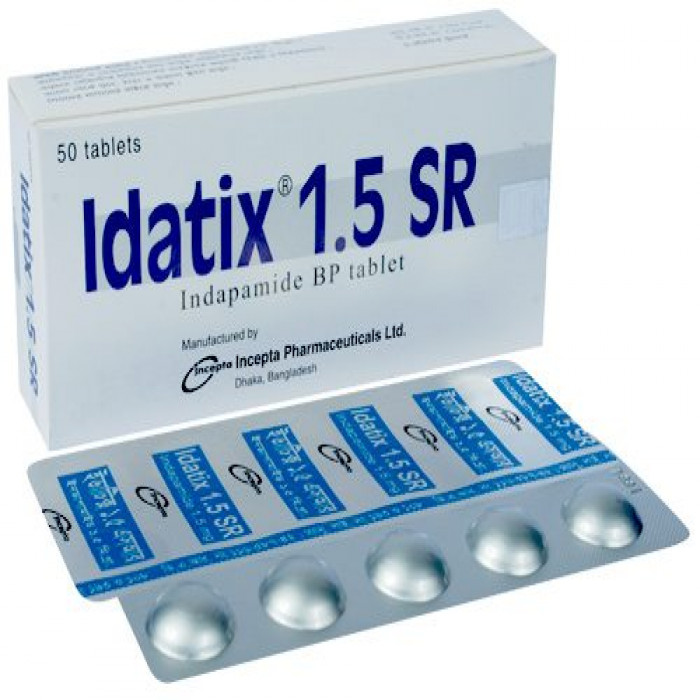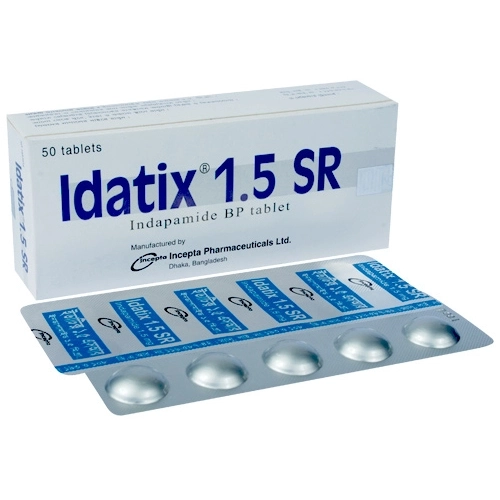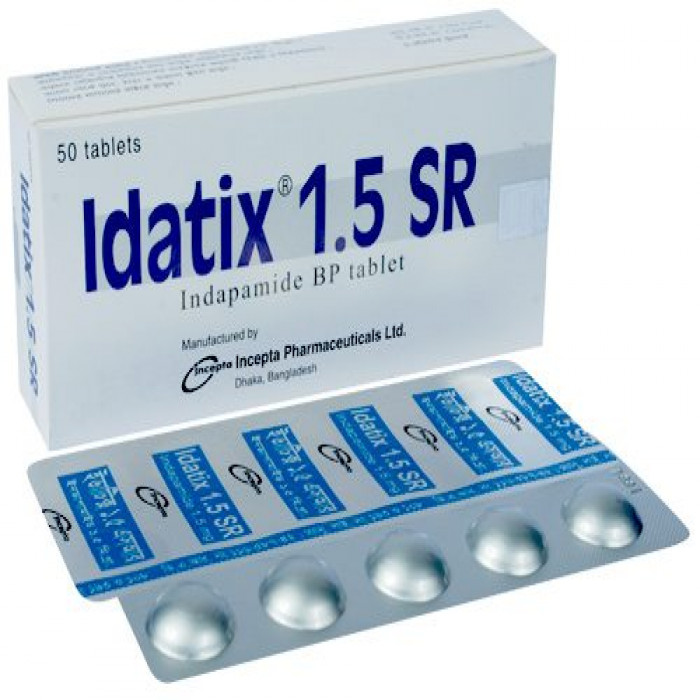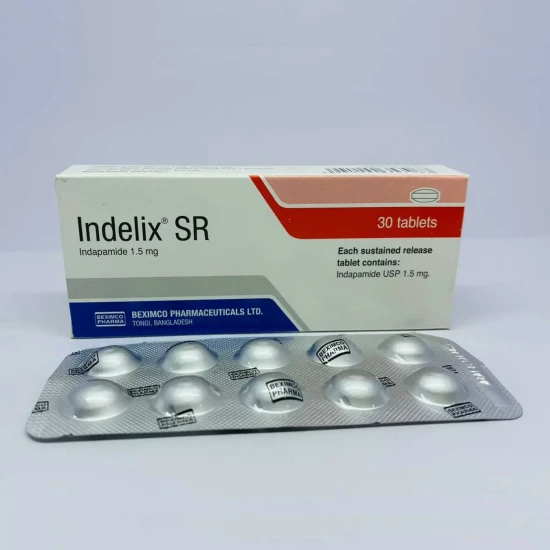
✔ 100% Authentic Product
👁️ Currently Viewing 952
Indapamide, the active ingredient in Idatix SR, is an oral antihypertensive agent. Its mechanism of action is not entirely understood but involves both vascular and renal effects. Potential benefits of Indapamide in treating hypertension include reducing cardiac hypertrophy and arterial wall thickening, preventing fibronectin accumulation in coronary vessels, scavenging free radicals to stimulate vasodilator eicosanoid production, and interacting with renal carbonic anhydrase. Its primary site of action in the kidney is the proximal segment of the distal tubule, where it promotes sodium and chloride excretion with minimal impact on potassium or uric acid levels. Urinary volume increase is noticeable only at doses exceeding 1.5 mg per day. Clinical studies have not observed significant changes in plasma sodium levels, although hypokalemia (potassium <3.2 mmol/L) has been reported in 4% of patients.
Discount
Price: ৳ 47
MRP:
৳
50
6%
Off

100% Genuine Products, Guaranteed

Safe & Secure Payments, Always

Fast, Secure & Efficient Delivery

Proper Packaging
 Cash on Delivery - All over Bangladesh
Cash on Delivery - All over Bangladesh Regular Delivery - 12-24 Hours, Dhaka City* Charge Tk.39-59
Regular Delivery - 12-24 Hours, Dhaka City* Charge Tk.39-59 Regular Delivery - 24-48 Hours, Other Cities* Charge Tk.99-110
Regular Delivery - 24-48 Hours, Other Cities* Charge Tk.99-110
 ফ্রি ডেলিভারিঃ - ৯৯৯ টাকা+ অর্ডারে, ঢাকা
শহরে
ফ্রি ডেলিভারিঃ - ৯৯৯ টাকা+ অর্ডারে, ঢাকা
শহরে ফ্রি ডেলিভারিঃ - ২৯৯৯ টাকা+ অর্ডারে, ঢাকার
বাহিরে
ফ্রি ডেলিভারিঃ - ২৯৯৯ টাকা+ অর্ডারে, ঢাকার
বাহিরে
100% Genuine Products, Guaranteed
Safe & Secure Payments, Always
Fast, Secure & Efficient Delivery
Proper Packaging
 Cash on Delivery - All over Bangladesh
Cash on Delivery - All over Bangladesh Regular Delivery - 12-24 Hours, Dhaka City* Charge Tk.39-59
Regular Delivery - 12-24 Hours, Dhaka City* Charge Tk.39-59 Regular Delivery - 24-48 Hours, Other Cities* Charge Tk.99-110
Regular Delivery - 24-48 Hours, Other Cities* Charge Tk.99-110 ফ্রি ডেলিভারিঃ - ৯৯৯ টাকা+ অর্ডারে, ঢাকা
শহরে
ফ্রি ডেলিভারিঃ - ৯৯৯ টাকা+ অর্ডারে, ঢাকা
শহরে ফ্রি ডেলিভারিঃ - ২৯৯৯ টাকা+ অর্ডারে, ঢাকার
বাহিরে
ফ্রি ডেলিভারিঃ - ২৯৯৯ টাকা+ অর্ডারে, ঢাকার
বাহিরে
✅ Description:

✔️ Absorption:
- Indapamide is rapidly and fully absorbed from the gastrointestinal tract. Food slightly alters its absorption rate and extent but has minimal clinical significance. Peak serum levels occur about 12 hours after administration, with repeated doses reducing serum level fluctuations.
✔️ Distribution:
Indapamide is widely distributed in the body, with strong binding to red blood cells (80%) and carbonic anhydrase (98%). Plasma protein binding is 79%. The drug has a half-life of 14 to 24 hours (mean 18 hours) and reaches steady-state concentration after seven days without accumulation.
✔️ Metabolism:
Indapamide undergoes extensive liver metabolism, with only 5-7% excreted unchanged in the urine.
✔️ Elimination:
The drug is primarily eliminated through urine (70%) and feces (22%) in the form of inactive metabolites.
✔️ Use in Pediatric Patients:
The safety and effectiveness of Idatix SR in children have not been determined.
Take medication only as advised by a registered physician.
✔️ Dosage & Administration
The standard dosage is one tablet daily, preferably in the morning. In severe cases, Idatix SR can be combined with other antihypertensive medications. The safety and efficacy of this medication in pediatric patients have not been established.
✔️ Side Effects
Possible side effects include dizziness, headache, nausea, vomiting, anorexia, constipation, diarrhea, and postural hypotension. Electrolyte imbalances may occur, such as hypochloremic alkalosis, hyponatremia, hypokalemia, and hyperuricemia. Hypersensitivity reactions, including skin rashes, cholestatic jaundice, and blood disorders (e.g., thrombocytopenia, leukopenia, and aplastic anemia), have also been reported.
✔️ Drug Interactions
- With Other Antihypertensives: Idatix SR may enhance the effects of other antihypertensive drugs. Clinical trials have shown no significant increase in adverse effects when combined therapy is used.
- With Norepinephrine: Similar to thiazides, Idatix SR may reduce arterial responsiveness to norepinephrine, but this reduction does not impair the therapeutic use of the pressor agent.
✔️ Idatix SR should not be used in the following conditions:
- Known hypersensitivity to the drug or sulfonamides
- Renal failure
- Severe liver disease
- Hypokalemia
✔️ Pregnancy & Lactation
Adequate and well-controlled studies in pregnant women are lacking; therefore, Indapamide is not recommended during pregnancy. Breastfeeding mothers should avoid taking this medication.
✔️ Precautions & Warnings
Caution is advised in patients with disturbed water or electrolyte balance, diabetes, gout, or kidney problems. Regular monitoring of serum potassium and uric acid levels is recommended.
✔️ Storage Conditions
Store in a cool, dry place, protected from light and moisture.
⚠️Disclaimer:
At ePharma, we’re committed to providing accurate and accessible health information. However, all content is intended for informational purposes only and should not replace medical advice from a qualified physician. Please consult your healthcare provider for personalized guidance. We aim to support, not substitute, the doctor-patient relationship.








